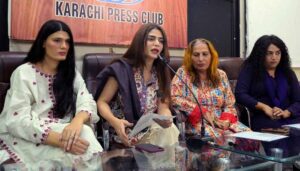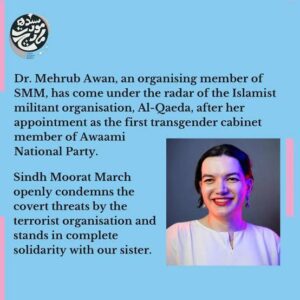Transgender rights in Pakistan have been a long-standing issue, with the Khwaja Sira community often facing systemic discrimination, violence, and marginalization. Despite legal progress, such as the 2018 Transgender Persons (Protection of Rights) Act, transgender individuals continue to struggle for basic human rights, including access to healthcare, education, employment, and protection from hate crimes. Movements like the Sindh Moorat March are crucial in advocating for these rights. This ongoing struggle is essential to advancing human rights and equality in Pakistan.
In a significant display of resilience and advocacy for human rights, the Sindh Moorat March (SMM) recently brought to light the pressing demands and challenges faced by the Khwaja Sira community in Pakistan. This annual event has grown to become a cornerstone for the indigenous transgender population’s fight for equality, recognition, and justice. The march reflects a deeper struggle against entrenched discrimination and systemic barriers, while also emphasizing the contributions and cultural heritage of the community.
The Context of the Moorat March
A local initiative, Sindh Moorat March, headed by Shahzadi Rai, stands as a unified voice for the Khwaja Sira community, underscoring their rightful place within Pakistani society. It demands justice and the urgent need for reforms that ensure the dignity, safety, and rights of transgender and intersex individuals. This year’s march took place amid heightened security and socio-political challenges, gaining widespread attention both nationally and internationally.
The march is not just a protest but a call for action. Demonstrators and organizers outlined a series of key demands aimed at addressing legal and social inequalities. These included criminalizing discrimination and hate speech based on gender identity and expression, ensuring equal access to housing, designated seating in public transportation, and the strict implementation of employment quotas in the public sector.
Shahzadi Rai’s Leadership
Shahzadi Rai, recently led a press conference and announced that the Sindh Moorat March will be held in Hyderabad on 24th November 2024.

During the conference she said:
“In Sindh, many Khwaja Sira have been killed. Criminals extort money from them, and landlords charge double rent. They are also denied job opportunities.”
Her statement highlights the grave challenges faced by the Khwaja Sira community in Sindh. She spoke about the increasing violence against Khwaja Siras, mentioning that many have been killed. She also addressed the exploitation by local criminals who extort money from the community, as well as the unfair housing practices, where landlords charge double rents, and the lack of job opportunities for Khwaja Siras.

Moreover, during the conference, she emphasized the community’s key demands, including legal recognition, anti-discrimination laws, and improved access to education and employment for Khwaja Siras. Rai’s leadership highlights her commitment to advancing the rights of the transgender community and ensuring their inclusion in Pakistani society. This strong leadership continues to fuel the momentum of the movement.
Shahzadi Rai is raising awareness about the alarming attacks and killings of Khwaja Sira individuals, calling for justice and accountability. She highlighted the growing violence against the transgender community, urging the government and society to take immediate action to protect their rights and lives. Additionally, Rai has been involved in the distribution of ration packets to assist those in need within the Khwaja Sira community, emphasizing solidarity and support for their well-being during challenging times.
Key Demands for Equality and Inclusion
At the core of the SMM’s agenda is a set of 12 crucial demands that highlight the fundamental rights of the transgender community:
1. Anti-Discrimination Laws: Legislation to criminalize all forms of discrimination and hate speech.
2. Justice for Violence: Ensuring that murders of Khwaja Siras are not dismissed under the Qisas and Diyat law, emphasizing that justice must be served equally.
3. Identity Recognition: Allowing individuals to select the X gender marker without medical gatekeeping, affirming self-determined identity.
4. Housing Rights: Addressing the housing crisis by criminalizing discriminatory practices in housing markets.
5. Public Transport Access: Instituting designated seating for Khwaja Sira individuals in all public transport within Sindh.
6. Employment Quota Enforcement: Implementing the 0.2% employment quota for Khwaja Siras in the public sector to ensure equal representation.
7. Health Initiatives: Creating government-funded HIV programs overseen by community-based activists.
8. Educational Reforms: Revising curriculums to include the cultural and political history of Khwaja Siras and sensitive coverage of intersex conditions.
9. Inheritance Rights: Guaranteeing equitable treatment in matters of inheritance.
10. Indigenous Recognition: Recognizing Khwaja Siras as a protected indigenous population through specific legislation.
11. Education Access: Enforcing quotas for Khwaja Siras in higher education.
12. Intersex Rights: Banning non-consensual surgeries on intersex children.
Challenges and Backlash
The announcement of Dr. Mehrub Awan as the first transgender cabinet member of the Awami National Party (ANP) has triggered a wave of reactions, including threats from extremist groups such as Al-Qaeda. In its Urdu publication ‘Nawa-e-Ghazwah-e-Hind’, the militant organization condemned Dr. Awan’s appointment, describing it as contrary to religious principles and highlighting a broader conflict over the rights and visibility of transgender individuals in Pakistani society.
Dr. Awan’s response to these threats has been a powerful reminder of the long-standing courage and determination of the Khwaja Sira community. “I come from ancestors who stood in front of British colonizers and their guns with swords and crossbows. I don’t know how to bow down or cower in front of self-proclaimed Gods on Earth,” she asserted, showcasing the enduring spirit of resilience.

A Growing Movement for Solidarity
The Sindh Moorat March has not only amplified the voices within the Khwaja Sira community but has also drawn attention from other human rights organizations and allies. With collaboration efforts such as the one with our news page and the official SMM social media, the message of inclusivity and equity continues to reach a wider audience.
As this movement for recognition and justice gains momentum, questions remain on how swiftly and effectively the government and civil society will act to uphold the rights of the Khwaja Sira community.
What will it take for Pakistan to fully embrace and protect the rights of its transgender citizens?
Related Stories:
Sindh Government Approves Pakistan’s First Transgender Education Policy
Sarah McBride Makes History as the First Transgender Person Elected to the U.S. Congress
Dr. Mehrub Awan: First Transgender in Pakistani Political Party
Pakistan Launches First Transgender-Friendly Ride-Sharing Service
















